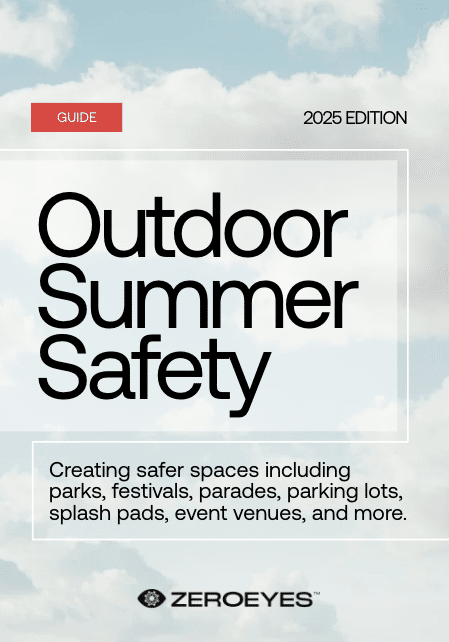Outdoor event safety is the foundation of every successful summer festival, concert, or parade. A well-prepared team ensures guests enjoy themselves while staying protected from unexpected situations. Here’s how to get your staff and volunteers ready for safe, secure outdoor events.
Assign Roles and Responsibilities
Start by defining each team member’s role. Assign staff to manage entrances, monitor crowds, handle emergencies, and communicate with first responders. When everyone knows their job, your outdoor event safety plan works efficiently.
When assigning roles, consider each team member’s strengths and experience. Matching people to tasks that suit their skills not only improves efficiency but also helps everyone feel more confident in their responsibilities.
For even smarter planning, cross-train staff for multiple roles. It can provide valuable flexibility in case someone is unavailable.
Provide Hands-On Safety Training
When it comes to event safety, never rely on manuals alone. Schedule outdoor event safety training that covers threat recognition, crowd control, de-escalation, and basic first aid.
Practice real-life scenarios, like evacuations or lost-child incidents, to build confidence and quick-response skills.
Ongoing training throughout the season keeps your team sharp and ready for new challenges. Bringing in local emergency personnel for joint drills can foster better coordination and give your staff a real sense of what to expect in a crisis.
Walk the Venue and Review Your Outdoor Safety Checklists
Before the event, walk through the space together. Point out exits, emergency access, and high-traffic areas. Show where to find first-aid kits and communication devices. Use an event safety checklist to ensure nothing is missed.
Walkthroughs are another great—and wise—opportunity to involve local emergency services, as they can provide fresh perspectives and highlight potential blind spots in your plan. Fire marshals, police officers, or EMTs may spot issues with access routes or suggest improvements to signage and crowd flow. Their input can be invaluable, especially for large or complex venues.
Set Up Reliable Communication
Equip your team with radios or headsets and establish clear communication protocols. Decide on primary and backup channels for reporting incidents. Fast, clear communication is essential for outdoor event safety.
More on backup communication methods: They’re essential. Do not skip them. If your radios fail or coverage is weak in certain areas, mobile apps or group text alerts can keep your team connected. Test all devices before the event and ensure everyone knows how to use them.
Also, always designate a communication lead who can troubleshoot issues and relay urgent updates as needed.

Practice Emergency Plans
Review and rehearse emergency procedures with your team. Practice evacuation routes, shelter-in-place instructions, and meeting points. After each drill, gather feedback and update your event safety checklist as needed.
Making drills as realistic as possible prepares your team for the stress and unpredictability of a real emergency. Use role-play scenarios, sound cues, or even simulated crowds to create realistic practice environments. Include volunteers and temporary staff in every drill so no one is left out of the loop.
Seems excessive? It isn’t. This commitment to practice is what separates truly prepared teams from the rest.
Encourage Awareness and Reporting
Remind staff to stay alert and report anything unusual, from unattended bags to guests in distress. Build a culture where team members feel confident speaking up.
Building this culture of vigilance does more than just prevent incidents—it empowers your staff to take ownership of the event’s overall safety.
Recognize and reward proactive reporting, and make it clear that every observation, no matter how small, matters. When team members know their input is valued, they’re more likely to speak up, creating a safer environment for everyone.
Adapt for the Unexpected
Outdoor events face unique challenges—weather, crowds, and open perimeters. Prepare for severe weather, medical emergencies, and lost children.
Make sure your team knows how to adapt quickly if plans change. Encourage them to stay flexible and think on their feet. Conduct brief scenario discussions during pre-event meetings to help everyone anticipate possible curveballs.
By normalizing adaptability and quick decision-making, your team can remain calm and effective even if/when the unexpected happens.
Debrief and Improve
After the event, hold a debrief. Encourage open, honest feedback to discuss what worked and what needs improvement.
From troubleshooting to team building, debrief sessions can help your team on many levels, helping them to develop stronger instincts and a deeper understanding of what makes outdoor event safety truly effective.
A prepared team is your best defense for outdoor event safety. For a complete event safety checklist and expert strategies, download the ZeroEyes Summer Safety Guide. With the right preparation, your staff can help make every summer event safe and memorable.
Get the free guide now…
Take Your Event Safety to the Next Level
ZeroEyes’ proactive gun detection gives your security team a powerful advantage. It works with your existing cameras, delivering real-time, human-verified alerts to enable faster responses and help protect your guests when every second matters.
Whether you’re managing large crowds or late-night events, ZeroEyes detects firearms in any environment—day or night, rain or shine—helping you act quickly and save lives.
Ready to see the difference? Book a personalized demo with the ZeroEyes team and discover how advanced detection can transform your event security.

